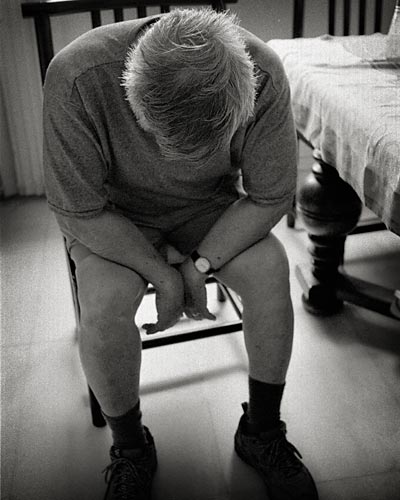thomasw_
Well-known
No, a sense of sadness at a loss is an emotion. Death itself is a state.It is an emotion to the living.
No, a sense of sadness at a loss is an emotion. Death itself is a state.It is an emotion to the living.
In earlier times, such as medieval European art, death was symbolized by a hand over the head or forehead, or a black hand; which later became symbolic of the Black Hand of organized crime, in Italy.
In contemporary times death is often noted by one's absence from the venue of the mechanized or built environment, since in living we seem to habitat our built environment almost exclusive of feeling at one with the natural world. As such, the attached photo illustrates how I symbolize death.
Photo taken in the backyard of my deceased father's house. 8"x10" preflashed paper negative in cardboard pinhole box camera, about 1 minute exposure, F275.
~Joe
The OP's question doesn't make sense, since death is not an emotion.
so lemme rephrase. how would you capture that grief, or glee? (more biased to the darker side of that...)It causes emotions in the living: all kinds of different ones, ranging from grief to glee.
yeah, poor wording... sorry. but most people got the point anyways. I was a bit tired...
so lemme rephrase. how would you capture that grief, or glee? (more biased to the darker side of that...)
JoeV's example is good. any others? (johnastovall, your link didn't work for me...)

how do you convey such a strong emotion through a photograph?
snipped (johnastovall, your link didn't work for me...)
When you see his scythe, lift your camera and shoot.
And do look at the Japanese pictures of Gene Smith, please. Such a weighty topic can not be thrashed about on the i-net, I believe. It will take your whole soul to enter into a photo contest with death of a relative or friend. Have you seen the Annie Leibowitz pics of Susan Sonntag dying? Look and see ...
And maybe leave this territory to others; you seem not ready to cross the Hades with camera in hand.
There is a tradition in a part of the southern USA of photographing dead people just before their funeral.
Really!, it's not just a southern US thing. Working in photolabs in Canada, I've seen a few photos of deceased in in caskets at funeral homes. I think of it as something older generation of Europeans might be into. I'm sure there are other cultures that do the same.
Walter Schels and Beate Lakotta did an incredible series of portraits of people before and after they died:
http://www.guardian.co.uk/society/ga...ture=333325401

